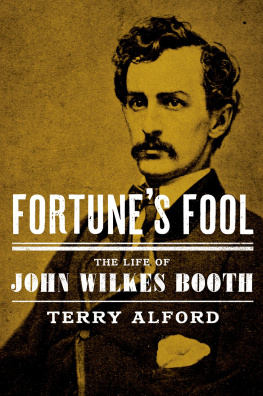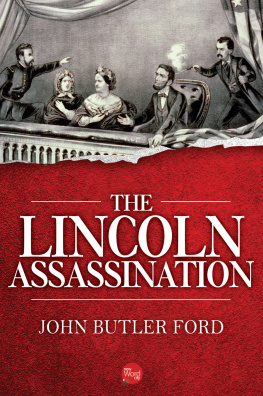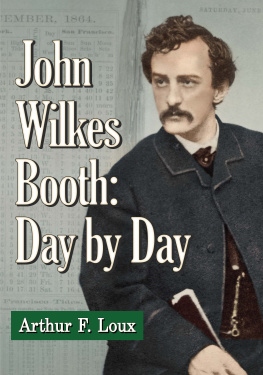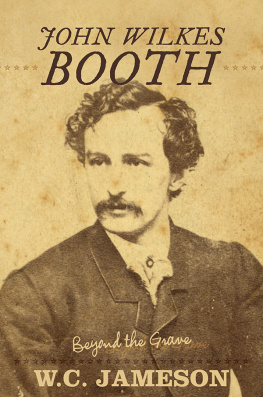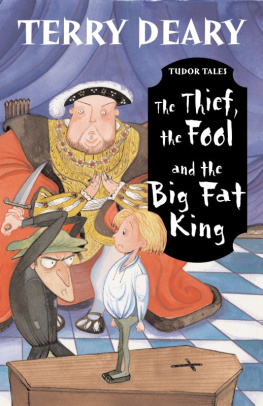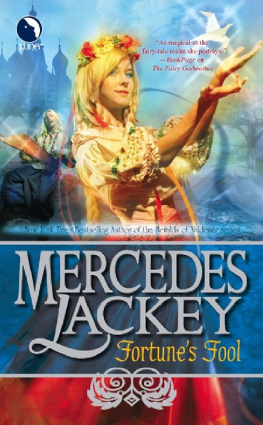Alford Terry - Fortunes fool: the life of John Wilkes Booth
Here you can read online Alford Terry - Fortunes fool: the life of John Wilkes Booth full text of the book (entire story) in english for free. Download pdf and epub, get meaning, cover and reviews about this ebook. City: United States, year: 2015, publisher: Oxford University Press, Incorporated, genre: Non-fiction. Description of the work, (preface) as well as reviews are available. Best literature library LitArk.com created for fans of good reading and offers a wide selection of genres:
Romance novel
Science fiction
Adventure
Detective
Science
History
Home and family
Prose
Art
Politics
Computer
Non-fiction
Religion
Business
Children
Humor
Choose a favorite category and find really read worthwhile books. Enjoy immersion in the world of imagination, feel the emotions of the characters or learn something new for yourself, make an fascinating discovery.
- Book:Fortunes fool: the life of John Wilkes Booth
- Author:
- Publisher:Oxford University Press, Incorporated
- Genre:
- Year:2015
- City:United States
- Rating:3 / 5
- Favourites:Add to favourites
- Your mark:
- 60
- 1
- 2
- 3
- 4
- 5
Fortunes fool: the life of John Wilkes Booth: summary, description and annotation
We offer to read an annotation, description, summary or preface (depends on what the author of the book "Fortunes fool: the life of John Wilkes Booth" wrote himself). If you haven't found the necessary information about the book — write in the comments, we will try to find it.
Fortunes fool: the life of John Wilkes Booth — read online for free the complete book (whole text) full work
Below is the text of the book, divided by pages. System saving the place of the last page read, allows you to conveniently read the book "Fortunes fool: the life of John Wilkes Booth" online for free, without having to search again every time where you left off. Put a bookmark, and you can go to the page where you finished reading at any time.
Font size:
Interval:
Bookmark:


Oxford University Press is a department of the University of Oxford. It furthers the Universitys objective of excellence in research, scholarship, and education by publishing worldwide.
Oxford New York Auckland Cape Town Dar es Salaam Hong Kong Karachi Kuala Lumpur Madrid Melbourne Mexico City Nairobi New Delhi Shanghai Taipei Toronto
With offices in Argentina Austria Brazil Chile Czech Republic France Greece Guatemala Hungary Italy Japan Poland Portugal Singapore South Korea Switzerland Thailand Turkey Ukraine Vietnam
Oxford is a registered trade mark of Oxford University Press in the UK and certain other countries.
Published in the United States of America by Oxford University Press
198 Madison Avenue, New York, NY 10016
Terry Alford 2015
All rights reserved. No part of this publication may be reproduced, stored in a retrieval system, or transmitted, in any form or by any means, without the prior permission in writing of Oxford University Press, or as expressly permitted by law, by license, or under terms agreed with the appropriate reproduction rights organization. Inquiries concerning reproduction outside the scope of the above should be sent to the Rights Department, Oxford University Press, at the address above.
You must not circulate this work in any other form, and you must impose this same condition on any acquirer.
Library of Congress Cataloging-in-Publication Data has been applied for.
ISBN 978-0-19-505412-5
ebook ISBN 978-0-19-023255-9
1 3 5 7 9 8 6 4 2
Printed in the United States of America
on acid-free paper
Dedicated to James O. Hall,
Historian, Mentor, Friend
....
when the african american educator John E. Washington was a boy walking home in the 1880s, he quickened his step when he passed Fords Theatre. In fact, he ran past the building. Eyes locked straight ahead, he refused to look in that direction. The old folks said there were ghosts there, and Washington could feel them. Restless spirits, begging for release, they flowed around the theater. After midnight one might be unlucky enough to encounter a specter face-to-face. It was well known that John Wilkes Booth, his eyes glowing like hot coals, prowled the alley behind the theater as he cursed his phantom horse.
Years later, in 1942, Washington published They Knew Lincoln, a collection of anecdotes about the great president from the previous generation of city residentsthe cooks, seamstresses, draymen, street vendors, and laborers whose voices often went unrecorded. Mostly former slaves, these people revered Abraham Lincoln, and Washington himself imbibed the spirit of their freedom as fully as if he, too, had been a personal beneficiary of the Emancipation Proclamation of 1863.
Lincolns life to these humble people was a miracle, he wrote. To the deeply emotional and religious slave, Lincoln was an earthly incarnation of the Savior of mankind. Was he not also a carpenters son, born in a humble log cabin? Was he not a worker in the field, unlettered and unsung? Was he not despised and rejected by men, and did he not know by experience their sorrow? Did he not yearn for the day when he might learn to read and write, and enjoy the pleasures of life for himself and his children? Upon whom could he depend in his hour of need but the Almighty God for comfort and guidance? Was he not inaugurated as President amidst the waving of flags and the sounds of trumpets, only to be martyred, as Christ was, because of his services for the lowly?
Washington had learned Booths name almost as soon as he learned Lincolns. That was because wherever history carried the great president, his assassin was not far behind. Booth left a different legacy. He was a killer of a most special kind. He wanted more than the life of one man. He wished to murder a nation and the freedom of a people.
Not surprisingly, the assassin preyed on Washingtons childhood imagination. One night when the boy was in bed, he realized that Booth was in the room with him. Booth pulled a dagger and lunged at him, chasing him over the bed. Washington dove under it, and Booth followed. Crying in fear, Washington leapt toward the ceiling and clutched onto a spiderweb. Booth flourished his knife and came after him. I was suddenly awakened by my Grandmother, just as the dagger was approaching my heart. She found me nearly suffocated by a large bundle of bedding with which I had covered my head and screaming at the top of my voice. It was only a nightmare.
No one would have been more surprised by Washingtons dream than Booth himself. During the New York City draft riots of 1863, mobs rampaged through Manhattan. African Americans, a principal target of their fury, were attacked both north and south of the Booth home on East 17th Street and from river to river. Booth spoke with detestation of the murdering of inoffensive negroes, wrote Adam Badeau, a federal officer living with the Booths at the time. At one point the rioters burned the Colored Orphan Asylum on Fifth Avenue. Randall, Badeaus African American servant from Louisiana, was in the Booth house that day. When it appeared that he might be in danger, Booth vowed to hide the youngster in the cellar. If the rabble came after him there, he said, he would protect the boy with his own life. Booth vigilantly watched over Randall for a week, until the riots ended.
John Wilkes Booth meant well to every human being, his contemporary Joseph Howard Jr., a top reporter for the New York Times, told his readers. None of you who judged him knew him.
the president was shot in a theater tonight and perhaps mortally wounded. When Lawrence A. Gobright, agent of the Associated Press in Washington, D.C., telegraphed this brief message to his subscribers in New York only moments after the assassination, one hundred and fifty years of writing on the death of Abraham Lincoln commenced. A vast literature on the death of the president has appeared over that time. Yet, oddly enough, Fortunes Fool is the first full-length biography of John Wilkes Booth ever written.
Historians have long recognized the need for such a book. It would fill an important gap in the assassination record as well as help dispel some of the absurd theories about April 14, 1865, and its aftermath. The old standby, Francis Wilsons John Wilkes Booth: Fact and Fiction of Lincolns Assassination (1929), was written by an author born in 1854 and is out of date. The books that came along in subsequent decades were a mixed lot, many written by special pleaders or conspiracy junkies. Recent titles, the best of which are mentioned in Notes on Sources, have been much better. Still, no Booth biography appeared. That was surprising, not only because there was an amazingif disturbingstory to be told, but it was apparent that without a thorough understanding of Booth our knowledge of the murder of Lincoln was lacking. After all, as Booths friend and co-conspirator Samuel Arnold explained, everything that happened was due to him. He alone was the moving spirit, said Arnold.
The story of Booths life is complex and the task of researching it formidable. There is no comprehensive collection of John Wilkes Booth papers with which to start, for example. Like many other highly verbal individuals, Booth was not much of a writer. His surviving letters are few and seldom revealing. Beyond a short memoir by his older sister Asia, his family members, horrified by what he did, left little about him. Government investigators compiled an invaluable mass of information in 1865 about Booths role as a conspirator, but the material focused on the assassination and did not give a broad picture of the mans life. If Booth had not been an actor and public figure before the murder, it would be impossible to recover his life in any meaningful depth.
Font size:
Interval:
Bookmark:
Similar books «Fortunes fool: the life of John Wilkes Booth»
Look at similar books to Fortunes fool: the life of John Wilkes Booth. We have selected literature similar in name and meaning in the hope of providing readers with more options to find new, interesting, not yet read works.
Discussion, reviews of the book Fortunes fool: the life of John Wilkes Booth and just readers' own opinions. Leave your comments, write what you think about the work, its meaning or the main characters. Specify what exactly you liked and what you didn't like, and why you think so.

